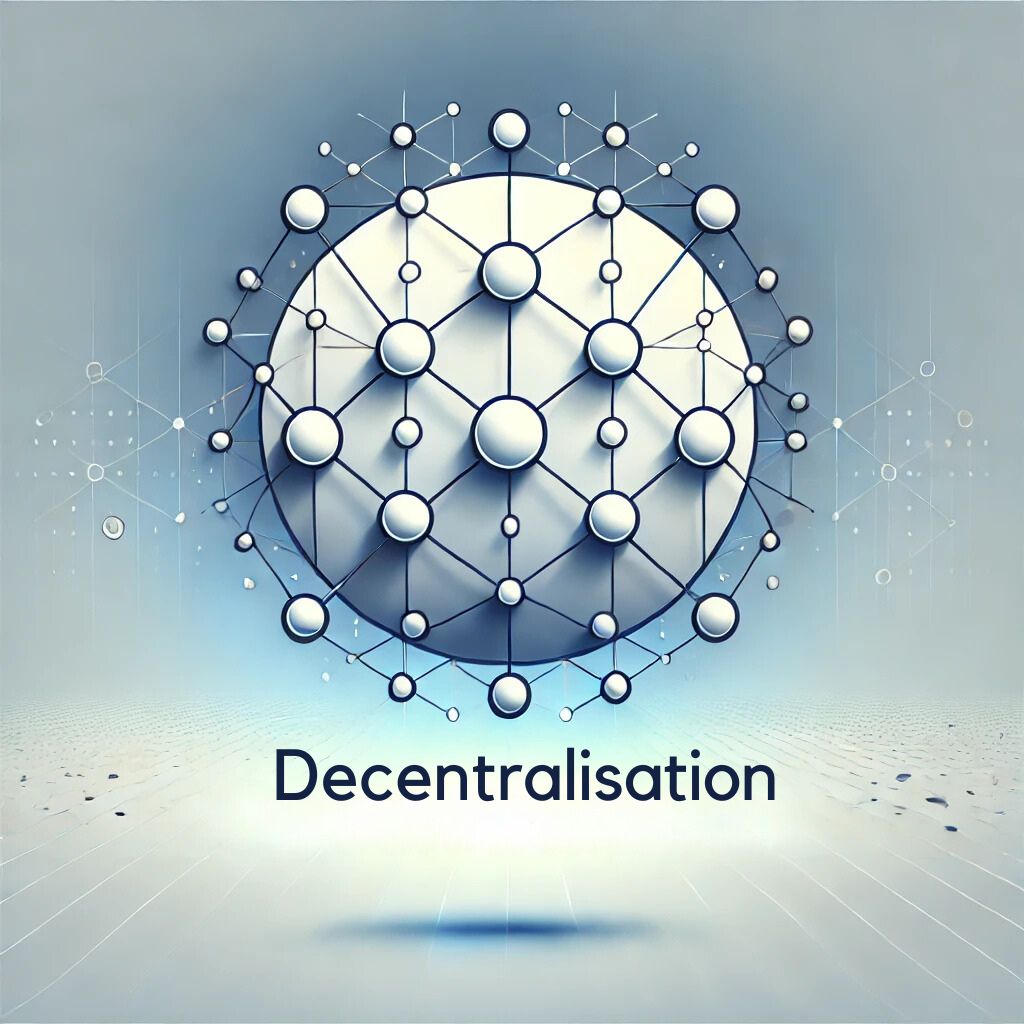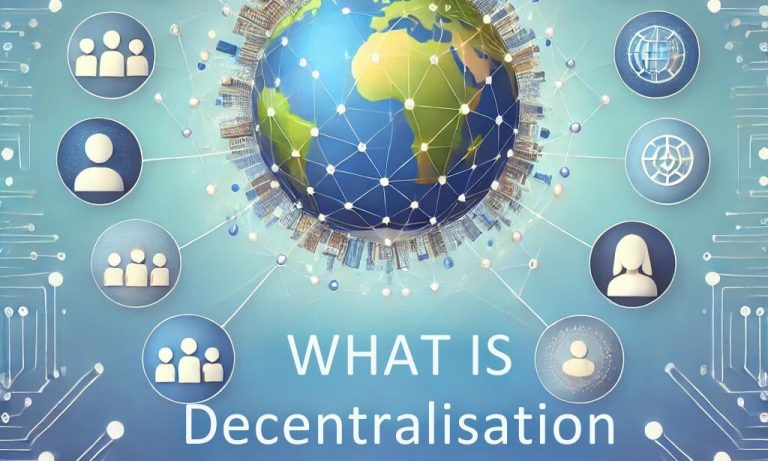The delegation or distribution of authority and decision-making power from a central unit or position to several smaller, decentralized, and local units or individuals means decentralization. This provides organizations, governments, and businesses with the ability to operate with more autonomy on different levels. Decentralization allows for the different decisions involved rather than having one person or entity have sole decisions as in the case of an old regime. This concept has applicability in business management, governance, and even such technology as blockchain.
What is Decentralisation?
Decentralisation refers to spreading out authority and power along various levels within an organization or system. In the former, all major decisions of a centralized system are decided by the central authority, but in the latter, this is distributed to various small units in decentralized systems. Decentralisation aims to increase efficiency, accountability, and flexibility by delegating to lower-level managers or local units the right to decide without always requiring central permission.
Business decentralisation is particularly useful for large organizations. A larger organization can respond more quickly to local issues and customer needs since it can give more control to regional managers or individual departments. This kind of structure is more conducive to innovation, as well as making it possible for employees at other levels to contribute more significantly to the decision-making process. Similarly, decentralization in government ensures that local authorities or states have the power to govern their areas, catering to the specific needs of their communities.
Decentralization can be political, administrative, and fiscal decentralisation, each with a different focus and application. These systems aim to create more transparent, responsive, and efficient operations. While decentralization offers several benefits, it also comes with its challenges, particularly in ensuring coordination between decentralized units and maintaining a uniform policy framework.

Importance of Decentralisation in Management
Decentralization plays a vital role in modern management practices. It gives organizations more freedom and agility to function. When decision-making authority is delegated to different levels of management, accountability increases, innovation takes place, and response time becomes faster.
In today’s fast business environment, managers have to make decisions that are aligned with the needs of the local market. Decentralisation empowers lower-level managers to respond quickly to changes in the business strategy, thus shortening the time it takes for ideas to go through the approval process. This encourages creative problem-solving and ensures that the business stays competitive in rapidly changing industries.
Involving the employees in the decision-making process through a decentralized management structure improves the morale of employees. It is particularly important for large organizations, where centralization would cause bottlenecks, inefficiencies, and lack of responsiveness.
It also promotes leadership development through decentralisation in management. In this process, the organizations can groom future leaders who have a good understanding of how the company operates at different levels. This will not only make the organization stronger but also create a culture of leadership and accountability at every level.

Types of Decentralisation in Management
The types of decentralization in management are designed to meet organizational needs. These types have to be understood by organizations as a prerequisite for the proper implementation of the decentralized structure in businesses.
Administrative Decentralisation
Administrative decentralization involves the delegation of authority and responsibility for administrative functions to local units or departments. Decentralization of decision-making in this type occurs within various departments, where such units can perform their routine functions without any external influence. Every unit or department is given the autonomy to make decisions regarding budget, human resources, and all available resources within its purview. By decentralizing the administration, businesses reduce the central leadership load and have more streamlined operations at the departmental level.
Political Decentralisation
Political decentralization is the transfer of decision-making authority to smaller government agencies or political units. It is the case in the federal system where states or provinces make and apply laws to their respective local needs. This means that political decentralization ensures governance becomes closer to people, as this allows issues relevant to the locality to be addressed.
In countries like India, political decentralization has played an important role in making local governments much stronger and ultimately gave them much authoritative decision-making power directly relating to their communities. This only works to ensure fairer development because it fixes regional challenges.
Fiscal Decentralization
Fiscal decentralization means the transfer of financial power and responsibility to local governments or departments. This type of decentralization ensures that local authorities have control over their budgets and can raise funds for local development. Fiscal decentralization is very important for promoting local economic growth and ensuring resources are effectively allocated at the local level.
Because of the decentralization of fiscal duties, governments can have better control over their incomes and expenditure budgets while investing in much-needed local infrastructure, schools, health care, and other services directly benefiting the people. Local units receive greater control over their financial activities, so the allocation of funds is more accurate and cost-effective.
Advantages of Decentralisation
Decentralization offers an organization many advantages, including both organizational and governmental benefits. Improved decision-making capability, greater local responsiveness, and even more operational efficiency and customer satisfaction can occur through the implementation of decentralization.
Enhanced Decision-Making
Decentralization removes the obstacles of decision-making at higher organizational levels; employees at various levels can make decisions, which enables them to respond faster to local challenges. This is important for businesses that operate in different markets; local conditions may vary dramatically. With decentralized decision-making, an organization is more likely to be adaptive and proactive in attending to the needs of its customers.
Increased Innovation and Creativity
Decentralization encourages all employees, whether at the top, middle, or bottom rungs of the hierarchy, to think critically and introduce new ideas. With increased freedom, employees feel able to experiment with new solutions and approaches. This in turn will increase innovation within the organization and keep it competitive while making it better adapt to changing markets. Additionally, people involved in decision-making often find themselves more engaged and invested in the organization’s success.
Improved Accountability
Decentralized decision-making places accountability in a more direct relationship with those who make the decisions. Each department or unit owns results that they can easily follow and track performance, but they can also easily identify areas for improvement. This helps create an attitude of responsibility among employees and makes their performance higher.
Faster Response to Local Needs
Decentralisation allows organizations to respond more quickly to local issues and customer needs. Local managers can make decisions without waiting for a central authority to approve them, thus solving problems faster. In a fast-paced business environment, this can be a huge competitive advantage, especially for companies operating in diverse markets.
Disadvantages of Decentralisation
Even though decentralization offers various benefits, it also brings in certain challenges. Organizations and governments need to carefully ponder these disadvantages while establishing decentralized structures so that they are well-balanced with advantages.
Lack of Coordination
The major disadvantage of decentralization is the lack of coordination between different units or departments. Since each unit holds the power to make decisions individually, it becomes hard to determine whether the decisions are in line with the overall strategy of the organization. This may lead to inconsistent policies and practices in the organization, which causes confusion among employees and customers.
Increased Costs
Sometimes, decentralization involves more operational costs. More units can lead to dispersion of decision-making. Some units may require separate resources from other units, resulting in double efforts and overhead. Sometimes decentralization may require a chain of management layers with consequently higher salaries and administrative costs.
Inconsistent Policies
A decentralized system makes it difficult to keep uniform policies across all units. Each department or region would have its approach toward the problems, and thus inconsistent practices and policies will prevail, which leads to a lack of standardization, thus making it hard to keep control and consistency within the organization.
Risk of Misalignment with Organizational Goals
Decentralization at times may lead to units or departments working towards individual goals that are not aligned with the organization’s overall goals. In decentralization, decision-making authority is distributed to local managers or units, and there is a possibility that they may pay too much attention to their specific area and forget about the organization’s broader goals. This can result in poor overall performance of the organization.
What is the Need of Decentralisation in India?
Decentralization in India is very important in satisfying the needs of the huge and diversified population of this country. Given the huge area of geography and the socio-economic differences between different regions, decentralization gives the opportunity to local governments to respond to the different requirements of different regions. In addition, those nearest to the issues will make decisions, hence creating a more responsive and efficient system of governance.
Enhances Local Governance
Decentralization will increase the strength of local governance. The municipalities, panchayats, and state governments will be able to decide on their own and execute policies. This would enable the local authorities to respond to the needs of the people in terms of education, health, and infrastructure. It would bring greater efficiency in the use of resources and enhance regional development.
Promotes Accountability and Transparency
In India, decentralization promotes transparency because it makes the local leaders and government bodies accountable to their constituents. As more power is conferred on local authorities, citizens will be able to hold their elected representatives accountable for the decisions that they make. This kind of accountability is essential to reducing corruption and improving the trust that people have in government institutions.
Facilitates Inclusive Development
Decentralization in India would mean that development reaches the innermost parts of the nation. By giving states and local government bodies the right to frame their policies. Moreover, development projects ensure that they correct regional imbalances and distribute benefits equitably among all citizens. This is even more relevant in areas where local issues may not have come under the purview of the central governance system.
Decentralization FAQs
What is decentralization in simple terms?
Decentralization means distributing decision-making authority from a central leader or government to smaller units or regions. It allows local units to make decisions that suit their needs better, making the process more responsive and efficient.
Why is decentralization important in management?
Decentralization in management is important because it allows quicker decision-making, better innovation, and increased accountability. Managers at different levels can address local issues without waiting for central approval, leading to faster response times and higher productivity.
What are the different types of decentralization?
There are three main types of decentralization: administrative decentralization, political decentralization, and fiscal decentralization. Each type focuses on different aspects, such as administrative functions, political decision-making, and financial control.
What are the advantages of decentralization?
Some advantages of decentralization include improved decision-making, enhanced innovation, increased accountability, and faster response to local needs. It helps organizations become more adaptable and efficient, especially in diverse markets.
What is the need for decentralization in India?
India needs decentralization to address regional issues, promote local governance, and ensure inclusive development. By empowering local governments, decentralization improves transparency, and accountability, and ensures that policies cater to local needs.


